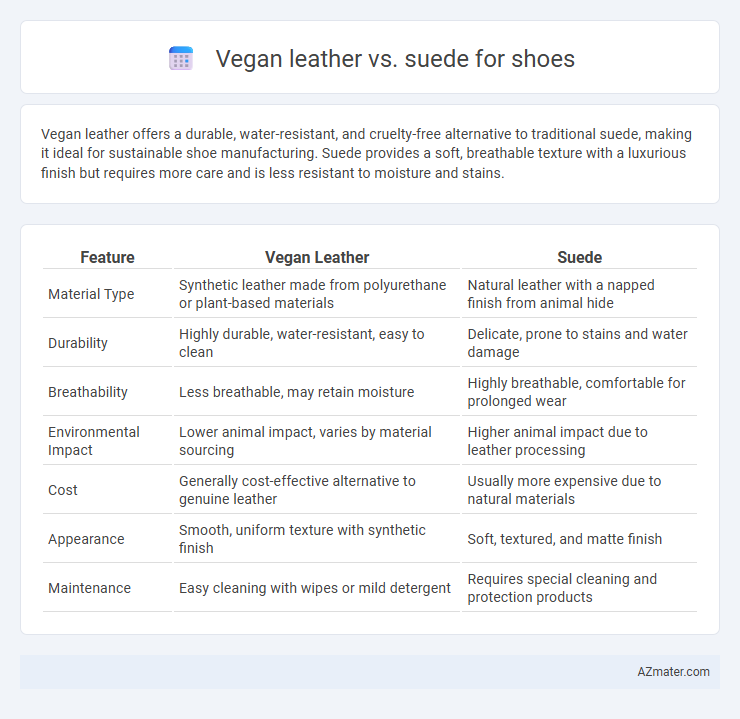Vegan leather offers a durable, water-resistant, and cruelty-free alternative to traditional suede, making it ideal for sustainable shoe manufacturing. Suede provides a soft, breathable texture with a luxurious finish but requires more care and is less resistant to moisture and stains.
Table of Comparison
| Feature | Vegan Leather | Suede |
|---|---|---|
| Material Type | Synthetic leather made from polyurethane or plant-based materials | Natural leather with a napped finish from animal hide |
| Durability | Highly durable, water-resistant, easy to clean | Delicate, prone to stains and water damage |
| Breathability | Less breathable, may retain moisture | Highly breathable, comfortable for prolonged wear |
| Environmental Impact | Lower animal impact, varies by material sourcing | Higher animal impact due to leather processing |
| Cost | Generally cost-effective alternative to genuine leather | Usually more expensive due to natural materials |
| Appearance | Smooth, uniform texture with synthetic finish | Soft, textured, and matte finish |
| Maintenance | Easy cleaning with wipes or mild detergent | Requires special cleaning and protection products |
Introduction to Vegan Leather and Suede
Vegan leather, crafted from synthetic materials like polyurethane or innovative plant-based sources, offers a cruelty-free, water-resistant alternative to traditional leather with a smooth or textured finish. Suede, derived from the underside of animal hides, is known for its distinct soft, napped texture and luxurious appearance but requires careful maintenance due to its susceptibility to water and stains. Comparing vegan leather and suede highlights the balance between ethical sustainability and classic tactile appeal in shoe materials.
Material Composition: Vegan Leather vs Suede
Vegan leather is typically made from synthetic materials such as polyurethane (PU) or polyvinyl chloride (PVC), offering durability and water resistance, while suede is derived from the underside of animal hides, primarily cowhide, characterized by its soft, napped finish. Vegan leather provides a cruelty-free alternative with consistent texture and easier maintenance, whereas suede requires more delicate care due to its porous and absorbent surface. The material composition of vegan leather lends itself to greater environmental considerations depending on the manufacturing process, contrasting with the natural but resource-intensive production of traditional suede.
Environmental Impact Comparison
Vegan leather, often made from polyurethane or plant-based materials like cork and pineapple leaves, generally has a lower environmental impact compared to traditional suede, which is derived from animal hides involving resource-intensive livestock farming and chemical tanning processes. The production of vegan leather reduces greenhouse gas emissions and water usage, while suede manufacturing contributes significantly to deforestation, water pollution, and soil degradation. However, certain synthetic vegan leathers may involve non-biodegradable plastics, making plant-based options more eco-friendly alternatives in sustainable shoe production.
Durability and Longevity
Vegan leather offers superior durability compared to suede, resisting water, stains, and scratches more effectively due to its synthetic composition. Suede, made from the underside of animal hide, tends to be more susceptible to wear, fading, and damage from moisture, requiring meticulous care to maintain its appearance. For long-lasting footwear, vegan leather provides enhanced longevity, making it a practical choice for everyday use and harsh conditions.
Comfort and Wearability
Vegan leather shoes offer a lightweight, water-resistant option that is easy to clean and maintain, making them highly durable for everyday wear. Suede shoes provide superior breathability and a softer, more flexible texture that molds comfortably to the foot over time, enhancing comfort during prolonged use. Both materials balance style and functionality, but vegan leather excels in moisture resistance while suede delivers a cozy, natural feel ideal for dry conditions.
Maintenance and Care Requirements
Vegan leather shoes require minimal maintenance, needing only regular wiping with a damp cloth and occasional application of a conditioner designed for synthetic materials to maintain their appearance. Suede shoes demand more diligent care, such as brushing with a suede brush to remove dirt and applying waterproof sprays to protect against stains and moisture. Compared to suede, vegan leather offers easier upkeep and better resistance to water damage, making it a practical choice for everyday footwear.
Aesthetic Differences and Style Options
Vegan leather offers a sleek, uniform finish with a modern and polished look ideal for contemporary and minimalist shoe designs, while suede provides a soft, textured surface that exudes a classic, vintage charm suited for casual and rustic styles. The matte appearance of suede enhances depth and warmth in footwear, contrasting with vegan leather's smooth shine that complements bold and sophisticated aesthetics. Style options with vegan leather often include vibrant colors and glossy finishes, whereas suede shoes favor muted tones and natural hues, emphasizing organic texture and subtle elegance.
Price Point Analysis
Vegan leather shoes typically offer a more affordable price point compared to genuine suede due to lower production costs and the use of synthetic materials like polyurethane or microfiber. Suede shoes, derived from animal hides, tend to be pricier because of the labor-intensive tanning process and the high-quality natural fibers involved. Consumers seeking budget-friendly footwear often prefer vegan leather options, while those valuing traditional craftsmanship may invest more in suede products.
Ethical Considerations in Shoe Choices
Vegan leather offers a cruelty-free alternative to traditional suede by eliminating the use of animal hides, making it a preferred choice for ethically conscious consumers. The production of vegan leather often involves sustainable materials like polyurethane or recycled plastics, reducing environmental impact compared to the resource-intensive tanning process of suede. Choosing vegan leather shoes supports animal welfare and promotes eco-friendly manufacturing practices, aligning with responsible and sustainable fashion values.
Conclusion: Which Material Wins for Shoes?
Vegan leather outperforms suede for shoes in durability, water resistance, and ethical considerations, making it a superior choice for conscious consumers. Suede offers a soft texture and breathability but requires more maintenance and is prone to damage from moisture. Overall, vegan leather provides a versatile, cruelty-free alternative that balances style and practicality.

Infographic: Vegan leather vs Suede for Shoe
 azmater.com
azmater.com